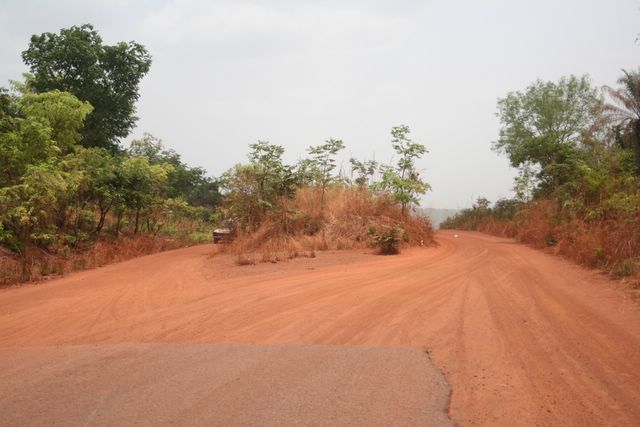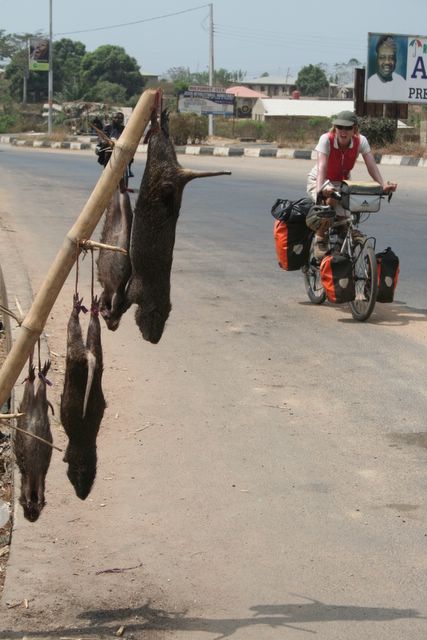update 12.
notorious nigeria
18 February to 6 March, 2007
Total kilometers cycled: 18,882
Specific country info on routes & roads/food & accommodation/the locals available here.
Nigeria's notoriety is unsurpassed in West Africa: institutionalized corruption at all levels, pervasive violent crime including highway banditry, and political and tribal tensions that risk to spill over into full-fledged combats at any moment. Our guidebook stated that they were unable to conduct on-the-ground research due to security issues in the country. Hardly the stuff that entices tourists. But, if we were to head further south we knew there was no way of circumventing Africa's most populous country, so we ignored the US State Department's travel warning and decided to give Nigeria a go.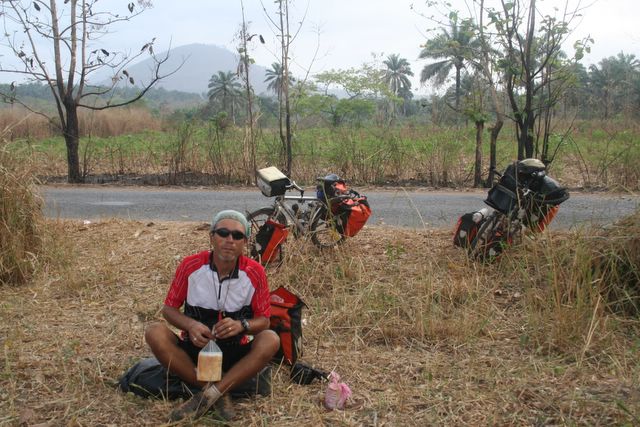 We
had chosen a little-used border crossing in order to avoid Lagos, and
as the tar road gave way to an ever narrower and bumpier dirt track, we
were asking ourselves what was in store for us. As we rode up, there
was much excitement at the border post on the Benin side--they were
obviously not accustomed to foreign travelers passing through their
tiny
village. Someone was sent off to find the official and dig
out
the necessary exit stamp. The formalities were long and drawn
out, and just as the official was placing the stamps in our passports,
he informed us that he felt it was his duty to make us aware of the
security situation across the border. "There's nothing but
bush
for the next 25 kilometers--no villages, no people, no
water--absolutely nothing. It's not unknown for
We
had chosen a little-used border crossing in order to avoid Lagos, and
as the tar road gave way to an ever narrower and bumpier dirt track, we
were asking ourselves what was in store for us. As we rode up, there
was much excitement at the border post on the Benin side--they were
obviously not accustomed to foreign travelers passing through their
tiny
village. Someone was sent off to find the official and dig
out
the necessary exit stamp. The formalities were long and drawn
out, and just as the official was placing the stamps in our passports,
he informed us that he felt it was his duty to make us aware of the
security situation across the border. "There's nothing but
bush
for the next 25 kilometers--no villages, no people, no
water--absolutely nothing. It's not unknown for 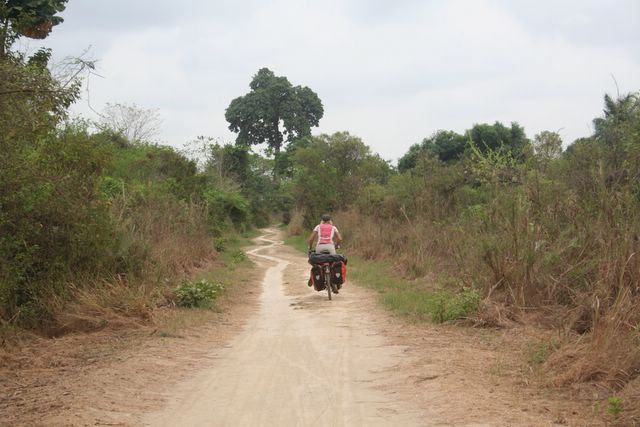 bandits
to attack
along that stretch of road,' he continued. 'Just last
Wednesday some armed thugs attacked a mini-bus and and
took all the passangers' money and valuables." Now, why hadn't he
mentioned all this BEFORE he put the exit stamp in the passports?
There was no turning back, so we took the
precautionary
measures of stashing our cash inside the pots and pans, and hiding the
expensive camera in the bottom of the sack. We left some
decoy
money and the small camera in the bar bag.
bandits
to attack
along that stretch of road,' he continued. 'Just last
Wednesday some armed thugs attacked a mini-bus and and
took all the passangers' money and valuables." Now, why hadn't he
mentioned all this BEFORE he put the exit stamp in the passports?
There was no turning back, so we took the
precautionary
measures of stashing our cash inside the pots and pans, and hiding the
expensive camera in the bottom of the sack. We left some
decoy
money and the small camera in the bar bag. As expected, there was little traffic on the 'road', and the track on the Nigerian side was even sandier and rougher, which made progress very slow. After several kilometers of slogging along, we sat down by the side of the road for a much-needed rest. As we were downing the last of our provisions (we had expected to find shops and roadside restaurants)three men on a motorbike pulled up next to us. They didn't look dangerous and we'd been told that bandits normally hide in the bushes and then jump out for a surprise attack, so we weren't feeling overly threatened. In fact, the men were merely curious and just wanted to welcome us to Nigeria. We were relieved.
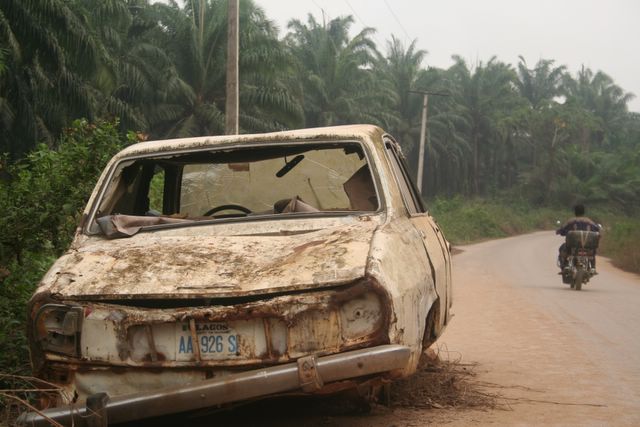 They confirmed that the road was indeed a
favorite spot for attacks, and tried to reassure us by telling us that
they would be 'praying that we meet no bandits in Nigeria'.
Well,
we didn't, and the people we did come into contact with were some of
the friendliest and kindest we've met in Africa.
They confirmed that the road was indeed a
favorite spot for attacks, and tried to reassure us by telling us that
they would be 'praying that we meet no bandits in Nigeria'.
Well,
we didn't, and the people we did come into contact with were some of
the friendliest and kindest we've met in Africa.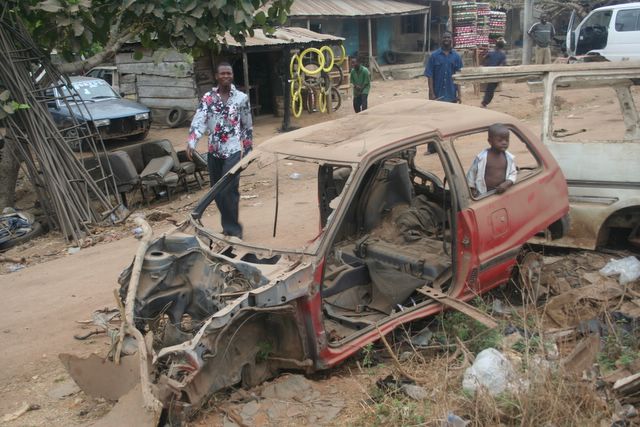 Yes,
the people are lovely, but the country itself is in an advanced state
of decay and dilapidation. Wrecked and rusting vehicles line
the
roads, attesting to the recklessness of local drivers.
Porches
are sagging, paint is peeling and once stately colonial-era buildings
are now crumbling and occupied by poor families. Running
water is
a rarity and it's even hard to find a pump that's working--they're
'spoiled' as the people like to say and nobody knows to fix them.
We saw electricity poles all over the country, but rarely was
electricity supplied. "The NEPA (Nigerian Electrical Power
Authority) has taken the lights again, we must on the gen
(turn on
the generator)." To the locals, NEPA
is better known as
Never Expect
Power Again.
Seems about right.
Yes,
the people are lovely, but the country itself is in an advanced state
of decay and dilapidation. Wrecked and rusting vehicles line
the
roads, attesting to the recklessness of local drivers.
Porches
are sagging, paint is peeling and once stately colonial-era buildings
are now crumbling and occupied by poor families. Running
water is
a rarity and it's even hard to find a pump that's working--they're
'spoiled' as the people like to say and nobody knows to fix them.
We saw electricity poles all over the country, but rarely was
electricity supplied. "The NEPA (Nigerian Electrical Power
Authority) has taken the lights again, we must on the gen
(turn on
the generator)." To the locals, NEPA
is better known as
Never Expect
Power Again.
Seems about right.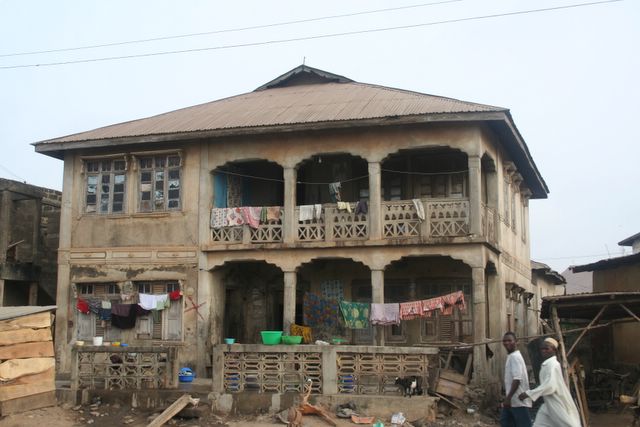 We
cycled through Nigeria quite quickly, not taking a rest day until we
reached the southern coastal city of Calabar (clean, green and
well-ordered, unlike the rest of the country), just 120 kilometers from
the Cameroon border. We followed a fairly central route,
wanting
to avoid the states north of the Niger River where Islamic sharia law
is in force (given the heat, Amaya wasn't keen on covering up from head
to toe) and the oil-rich southern Niger Delta region where kidnapping
of expats
is on the upswing. There were no spectacular
tourist sights to visit, but cycling alongside a lorry which is being
simultaneously overtaken by two other overloaded trucks on an uphill
stretch of a two-lane highway while a motorcycle tries to pass on the
right, leaving cyclists to flee for cover in the bush (shoulders on
roads are also a rarity) is another kind of unforgettable experience.
Nigeria brought a renewed sense of adventure we
hadn't known
since Sierra Leone.
We
cycled through Nigeria quite quickly, not taking a rest day until we
reached the southern coastal city of Calabar (clean, green and
well-ordered, unlike the rest of the country), just 120 kilometers from
the Cameroon border. We followed a fairly central route,
wanting
to avoid the states north of the Niger River where Islamic sharia law
is in force (given the heat, Amaya wasn't keen on covering up from head
to toe) and the oil-rich southern Niger Delta region where kidnapping
of expats
is on the upswing. There were no spectacular
tourist sights to visit, but cycling alongside a lorry which is being
simultaneously overtaken by two other overloaded trucks on an uphill
stretch of a two-lane highway while a motorcycle tries to pass on the
right, leaving cyclists to flee for cover in the bush (shoulders on
roads are also a rarity) is another kind of unforgettable experience.
Nigeria brought a renewed sense of adventure we
hadn't known
since Sierra Leone.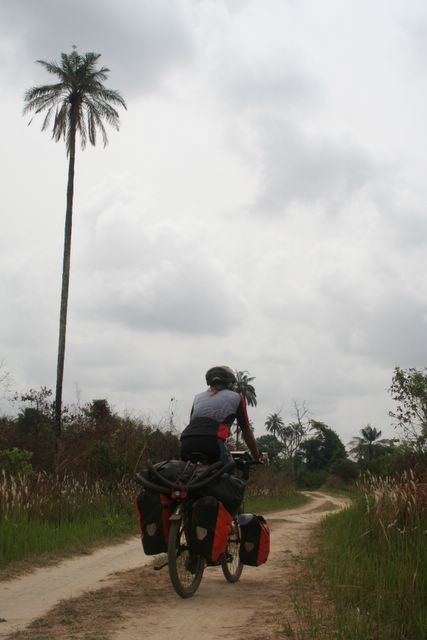 Arriving late one evening in Uromi we
got caught up in a local political
rally. The streets were thronged with people shouting slogans
and
young hotheads on motorbikes were weaving wildly through the crowd.
This was just the type of situation those
travel warnings (and
common sense!) told us to avoid. We did our best to remain
calm,
and there was no reason to believe that the demonstrators were
anti-Westerners, but it seemed things could turn ugly at the slightest
wrong move. We were in a hurry to find lodging, and relived to see a
sign advertising the Moonlight Motel. The hotel manager,
however,
was reluctant to show us a room. "You white people cannot
sleep in
such a place, I am sure of it," he insisted. "Why not?" we
asked. "There is not enough comfort for you. You do
not
know how to use a pit toilet". There was a toilet.
This was
good news. On our first night in Nigeria, in some remote
village
not far from the border with Benin, the only lodging available was a
room behind a bar where it turned there was no toilet. We
were
told to use the bush, which was fine, except that in the middle of the
night Amaya awoke with an urgent need to use the facilities and found
the
doors all tightly padlocked. It was a long and
uncomfortable night.
Arriving late one evening in Uromi we
got caught up in a local political
rally. The streets were thronged with people shouting slogans
and
young hotheads on motorbikes were weaving wildly through the crowd.
This was just the type of situation those
travel warnings (and
common sense!) told us to avoid. We did our best to remain
calm,
and there was no reason to believe that the demonstrators were
anti-Westerners, but it seemed things could turn ugly at the slightest
wrong move. We were in a hurry to find lodging, and relived to see a
sign advertising the Moonlight Motel. The hotel manager,
however,
was reluctant to show us a room. "You white people cannot
sleep in
such a place, I am sure of it," he insisted. "Why not?" we
asked. "There is not enough comfort for you. You do
not
know how to use a pit toilet". There was a toilet.
This was
good news. On our first night in Nigeria, in some remote
village
not far from the border with Benin, the only lodging available was a
room behind a bar where it turned there was no toilet. We
were
told to use the bush, which was fine, except that in the middle of the
night Amaya awoke with an urgent need to use the facilities and found
the
doors all tightly padlocked. It was a long and
uncomfortable night. In the end, we took the room at the Moonlight Motel and had a pleasant evening chatting with Happy, the hotel manager, his two sisters and several neighbors who had come by to have a look at the exotic tourists. In out-of-the-way places we always attract lots to gawkers. Most adults are subtle about it, but when one man was asked what he was doing outside the guesthouse gate he shamelessly replied, "I have come to look at the white woman." As if Amaya were some sort of zoo attraction!
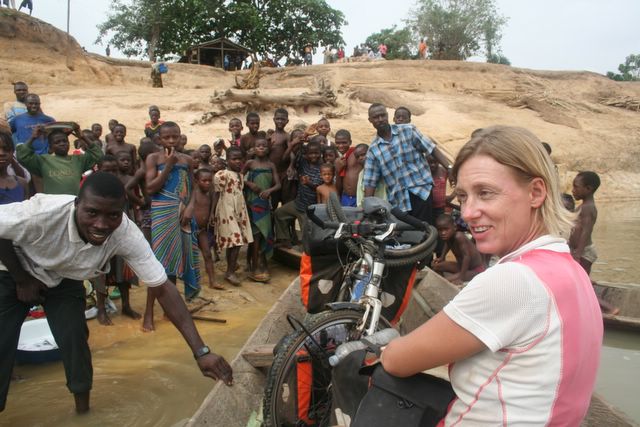 Nigeria boasts some of the highest highway
death tolls in the world, so we prudently decided to stick to minor
roads as much as possible. As we left Happy and friends
behind, we set off on a fine paved road through some rolling hills,
lush forest and wooded savanna. After a few hours ride we
spotted the Niger River in the distance and soon arrived at
the town of Illushi. Locals had assured us that there would
be a ferry here to take us across (some even said there was a bridge!).
There was nothing of the sort, and as we made our way to the
waterfront a crowd quickly gathered. The villagers seemed
perplexed and asked where we were headed. We too were
perplexed, as we could see no obvious road on the other side of the
river. After being assured that the road continued on the
other side, we negotiated a canoe to carry us across the Niger.
On the opposite shore of the river, the boatmen kindly pushed
our bikes through the deep sand and told us they would take us to the
road. They had been pushing an awfully long time and still no
road was in sight. We were getting worried. Finally
a narrow track appeared and then a cluster of huts. The road
must surely be connected to this village, we thought, and said goodbye
to the boatmen and thanked them for their help. This was a
mistake since nobody in the village seemed to understand English
(Nigeria's official language) and we couldn't find a road per se.
Confident that we were headed in the right direction, we
continued down the dirt track and hoped for the best.
Nigeria boasts some of the highest highway
death tolls in the world, so we prudently decided to stick to minor
roads as much as possible. As we left Happy and friends
behind, we set off on a fine paved road through some rolling hills,
lush forest and wooded savanna. After a few hours ride we
spotted the Niger River in the distance and soon arrived at
the town of Illushi. Locals had assured us that there would
be a ferry here to take us across (some even said there was a bridge!).
There was nothing of the sort, and as we made our way to the
waterfront a crowd quickly gathered. The villagers seemed
perplexed and asked where we were headed. We too were
perplexed, as we could see no obvious road on the other side of the
river. After being assured that the road continued on the
other side, we negotiated a canoe to carry us across the Niger.
On the opposite shore of the river, the boatmen kindly pushed
our bikes through the deep sand and told us they would take us to the
road. They had been pushing an awfully long time and still no
road was in sight. We were getting worried. Finally
a narrow track appeared and then a cluster of huts. The road
must surely be connected to this village, we thought, and said goodbye
to the boatmen and thanked them for their help. This was a
mistake since nobody in the village seemed to understand English
(Nigeria's official language) and we couldn't find a road per se.
Confident that we were headed in the right direction, we
continued down the dirt track and hoped for the best. 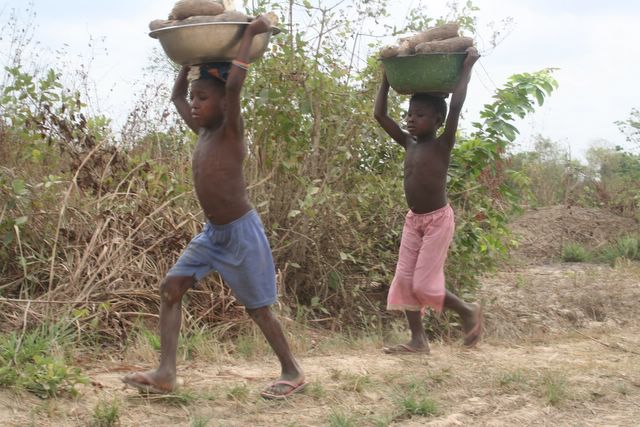
After an hour or so some motorcyclists appeared. We flagged them down and were thankful to find they spoke English. Apparently there was nothing in the direction we were headed. If we continued we would go only deeper into the bush and would never reach a road as such. This was bad news. We were told to backtrack and follow the piste along the river north to the town of Idah. We cursed our Michelin map for carelessly drawing a road where none existed and then turned around. It was an arduous day cycling, but when we finally arrived in Idah the locals were so welcoming that we soon forgot the difficulties. The next morning a local photographer was waiting outside of our room to 'snap' us with the proud guesthouse manager. We were very flattered.
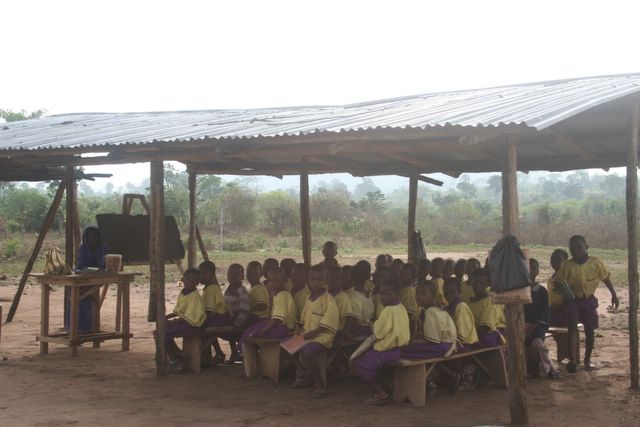 Roadblocks
are commonplace throughout Nigeria. Ostensibly in place to
maintain security and deter would-be bandits, in reality they're a
lucrative source of income for the local police and military.
Nobody's duped into believing the security forces are there
to serve, and money can be seen changing hands quite openly.
On busy roads we passed up to 20 roadblocks in a day and are
pleased to report that we almost always road through without a hitch.
Our strategy was to grin widely and wave furiously as we
enthusiastically greeted the officers in charge ( Gooood moooorning,
sir! Hooooow aaaare yoooouuuu?) and be on the other
side of the checkpoint before they could stop us. The officers had no
choice but to wave back and return the greeting, lest they appear
inhospitable towards foreign tourists. Only once
were we stopped by a military man toting some sort of semi-automatic
rifle who wanted to get the lowdown on our trip and scrutinize our
passports. He had obviously had too much palm wine and we let
out a sigh of relief we he finally let us go.
Roadblocks
are commonplace throughout Nigeria. Ostensibly in place to
maintain security and deter would-be bandits, in reality they're a
lucrative source of income for the local police and military.
Nobody's duped into believing the security forces are there
to serve, and money can be seen changing hands quite openly.
On busy roads we passed up to 20 roadblocks in a day and are
pleased to report that we almost always road through without a hitch.
Our strategy was to grin widely and wave furiously as we
enthusiastically greeted the officers in charge ( Gooood moooorning,
sir! Hooooow aaaare yoooouuuu?) and be on the other
side of the checkpoint before they could stop us. The officers had no
choice but to wave back and return the greeting, lest they appear
inhospitable towards foreign tourists. Only once
were we stopped by a military man toting some sort of semi-automatic
rifle who wanted to get the lowdown on our trip and scrutinize our
passports. He had obviously had too much palm wine and we let
out a sigh of relief we he finally let us go.Nigeria has left us with mixed feelings. While we loved the people, and enjoyed a variety of spectacular scenery from the stark beauty of the savanna to wild Tarzan and Jane jungle, we can't help being saddened and appalled at the lack of progress in a nation with such potential. Travel here isn't for the faint-hearted, but it does have its rewards if you keep an open mind and have a dose of good karma.
